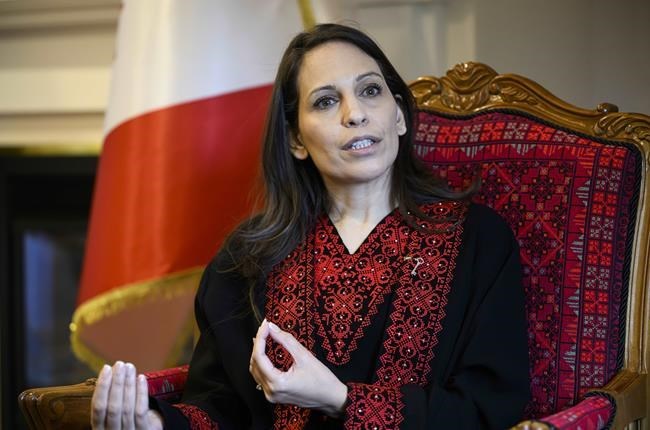OTTAWA — The Palestinian ambassador to Canada says she warned Ottawa six months ago that rising tensions in the region were going to explode into violence.
"It's not about justifying or not, (but) if you blow into a balloon, it has to pop,"Mona Abuamara, the chief representative of the Palestinian General Delegation to Canada, said in an interview Tuesday.
The envoy said that Israel's right-wing government has made it harder to work toward peace. She said Palestinians want Canada to be vocal about cases where Israel may have violated international law, citing this week's siege on Gaza or the expansion of certain settlements.
"Just implement the international law that you care so much about — that's our only ask," Abuamara said between meetings with MPs on Parliament Hill.
Abuamara said she's deeply disturbed by the recent bloodshed in the region, where more than 4,000 people have died on both sides of an escalating war.
The recent conflict began when militants from Hamas, which Canada has listed as a terrorist organization since 2002, killed hundreds of Israelis in brazen attacks in the southern part of the country on Oct. 7. Israel retaliated with airstrikes on the Hamas-controlled Gaza Strip, and cut its access to water, food and electricity.
Israel insists it is trying to clear out Hamas's leadership in the Gaza Strip to prevent terrorist attacks and that it is not targeting civilians. The United Nations has said the current siege violates international law.
The federal Liberal government in Canada has so far stressed that Israel has a right to defend itself, while respecting international humanitarian law.
On Tuesday, Prime Minister Justin Trudeau called a deadly rocket hit on a hospital in Gaza City "unacceptable," saying in French that such a strike would be not be legal. The Hamas-run Gaza Health Ministry had earlier blamed the attack on an Israel airstrike. Sometime after Trudeau made his comments, Israel said the hospital was hit by a missile launched by militants in Gaza.
In the interview, Abuamara said she wants Ottawa to continue calling for a humanitarian corridor to deliver aid to the Gaza Strip.
She would also like Canada to advocate for a ceasefire.
She argued that Canada's emphasis on Israel's right to defend itself has set the stage for violence against Palestinians living in the Gaza Strip.
Israel has said it has tried to spur economic opportunity in the territory, where it ended its decades-long occupation in 2005. Palestinians living in the Gaza Strip, which also borders Egypt, remain dependent on Israel for access to water and other utilities, and are subject to restrictions on movement.
Hamas seized power of the territory in 2007 and started regularly launching rockets into Israel, harbouring military assets near mosques and schools.
The Palestinian Authority, which is represented by the Palestinian General Delegation to Canada, is a government entity that oversees some aspects and areas the West Bank, a Palestinian territory occupied by Israel, but no longer has control in Gaza. Canada does not have any diplomatic relationship with Hamas.
Abuamara said any loss of life is unacceptable, but she argued the situation has made the territory, where about two million people live, resemble "an open-air prison" where people have no hope for freedom, safety or dignity.
"You can't tell people, 'You don't get to have justice.' And then torture them and then blame them whenever an incident happened — and I'm talking even years before the unfortunate events (this month) took place."
Some 700,000 Palestinians were expelled from or fled what is now called Israel during the wars that followed the United Nations' partition of what was then British-controlled Palestine into separate Jewish and Arab states in 1947. Israel declared independence the next year, while neighbouring Arab countries launched a war in opposition to the partition plan.
Abuamara also accused Canada of keeping quiet about actions by Israel that she says undermine Ottawa's long-standing policy for achieving peace in the Middle East. Canada supports a two-state solution that would see Israelis and Palestinians each having sovereign states that exist side-by-side.
"We the defeated people — the weak people under occupation — are asking for international law implementation while our oppressor or occupier flagrantly dismisses it altogether. And they're your steadfast ally," she said.
"Canada has put Palestine as an exception to the international, rules-based order it preaches," she said.
Abuamara said that includes Ottawa keeping quiet as Israel has moved toward expanding settlements that Canada considers to be illegal under international law — a characterization that Israel disputes.
The Liberal government's relationship with the government of Israeli Prime Minister Benjamin Netanyahu, which formed under a coalition with right-wing parties, had been under strain this year, including due to its criticism of Israel's judicial reforms.
The plan, which has sparked large protests in Israel, would allow Israel's parliament to overturn decisions by the country's Supreme Court.
In July, Trudeau said he was not planning to invite Netanyahu to make a stop in Canada as part of his visit to Washington, D.C., and said that the judicial reforms should not go ahead without widespread support from Israeli society.
"We remain steadfast friends of Israel, but every now and then we do have to point out where we disagree," Trudeau told reporters at the time.
Abuamara said these criticisms treated symptoms but not "the disease" — referring to Israel's occupation of Palestinian territories the blockade of Gaza — that has left Palestinians desperate.
She said she brought that message to officials at Global Affairs Canada about six months ago, describing the conversation as focused on "what could transpire."
"They knew, everybody knew that an explosion was imminent," she said.
This report by The Canadian Press was first published Oct. 17, 2023.
Dylan Robertson, The Canadian Press



